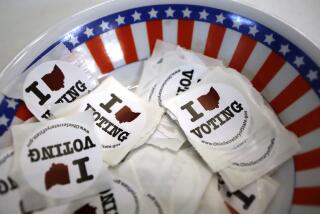Special Aid for Handicapped Travelers Left Up to Airlines : Bias Rules Don’t Apply--Justices
- Share via
WASHINGTON — The Supreme Court ruled today that airlines may discriminate against the handicapped in a 6-3 finding that a federal law protecting the rights of the disabled does not apply to air travelers.
Justice Lewis F. Powell, writing for the court, said airlines are exempt from a provision of federal law that revokes federal aid to those who discriminate against the handicapped.
Commercial airlines do not receive federal aid directly, Powell said, although they may benefit indirectly from aid to airports.
Powell said, “Congress imposes the obligations of (the anti-discrimination law) upon those who are in a position to accept or reject those obligations as a part of the decision whether or not to receive federal funds. In this case, the only parties in that position are the airport operators.”
‘85 Ruling Overturned
The court overturned a 1985 ruling by the U.S. Circuit Court of Appeals here which said the 1973 anti-discrimination law applies to airlines.
The appeals court said the law applied to the airlines because they benefit from the government’s air traffic control system that costs taxpayers more than $2 billion a year.
But Powell said since the air traffic control system is owned and operated by the government, it is not a form of federal aid that may be cut off to airlines practicing discrimination against the disabled.
Today’s ruling canceled an order by the federal appeals court that the Department of Transportation draw up rules to assure the protection of the rights of handicapped airline passengers.
Victory for Administration
The decision is a victory for the Reagan Administration, which argued that the 1973 law applies only to a handful of small airlines that receive direct federal subsidies.
Plaintiffs in the case, the Paralyzed Veterans of America and the American Council for the Blind, said mandating protection for the disabled would eliminate such “arbitrary and humiliating practices” of some airlines that require blind passengers to sit on blankets for fear they will be incontinent because they cannot get to the toilet.
The groups also said airlines have barred some handicapped people from traveling at all or require them to travel with an attendant. Also, they said, some airlines require the disabled to sign waivers excusing the airline from liability for damage to wheelchairs.
No Blatant License
James Gashell of the National Federation of the Blind said the ruling was “obviously unfortunate” but “it does not mean, as a matter of public policy airlines may go around discriminating against blind people, and get away with it.”
Dissenting today were Justices Thurgood Marshall, William J. Brennan and Harry A. Blackmun.
Marshall, in an opinion joined by the two others, said, “Commercial airlines . . . act as gatekeepers controlling who shall enjoy, and under what conditions, important benefits under federally funded and conducted programs.” They should be required to abide by federal anti-discrimination law, Marshall said.
More to Read
Sign up for Essential California
The most important California stories and recommendations in your inbox every morning.
You may occasionally receive promotional content from the Los Angeles Times.










